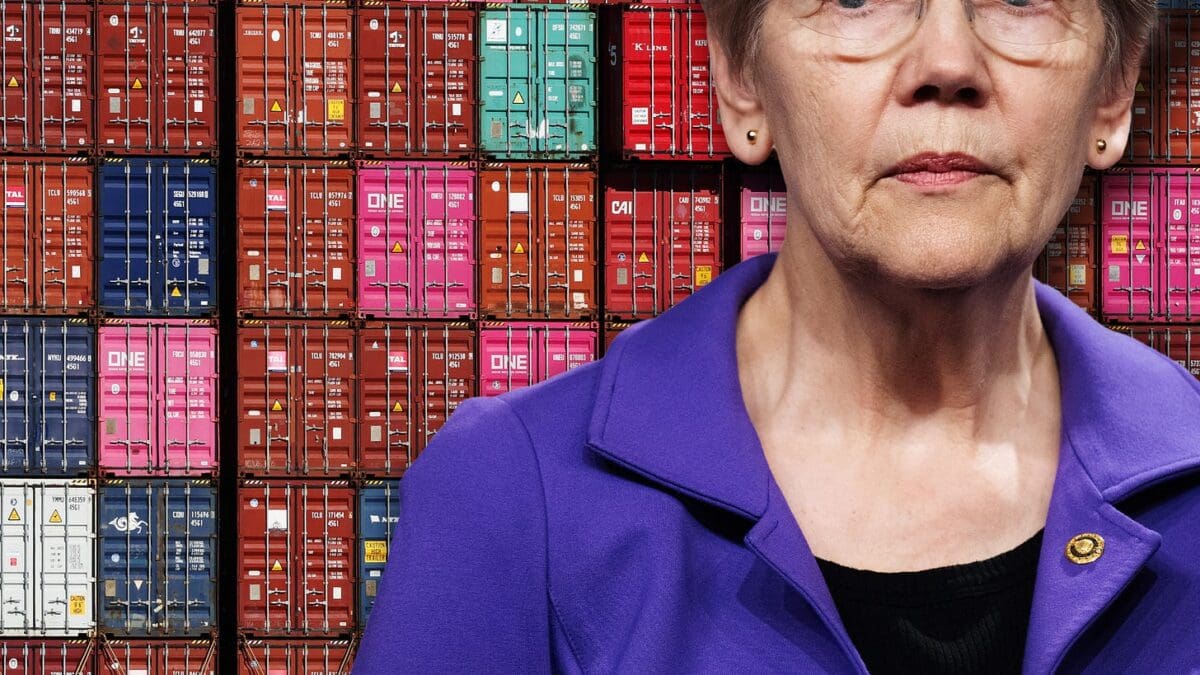
The Damage Can’t Be Undone
April 9, 2025
House Republicans Pass Bill Letting Musk ‘Fleece Consumers’ With His X Money Scheme | Common Dreams
April 9, 2025When Sen. Elizabeth Warren came to Nashville on Saturday to whip up opposition to Donald Trump, there was fiery talk of taking on the oligarchy, sharp criticism of tech billionaires, and pointed denunciations of Elon Musk for, among other things, ripping apart the federal government.
But when the topic turned to tariffs, Warren’s fire and brimstone suddenly gave way to circumspection and nuance.
“Tariffs can be an important tool in the economic toolbox,” the senator told The Bulwark in an interview. She explained that 90 percent of our prescription drugs are manufactured overseas, which leaves us in a “very vulnerable place as a nation.” With a targeted and thoughtful approach, she argued, tariffs could be “one effective way to have stronger manufacturing here in the United States.”
Warren wasn’t complimentary of the tariff regime Trump announced last week. She accused the president of trying to impose tariffs “with no understanding of how that will affect current manufacturing in the Untied States, much less any opportunities to develop new production here” and said his approach “makes no sense at all.”
She argued that he had collapsed the markets, created uncertainty, and raised prices for consumers after having “promised to lower costs on day one for American families.”
But her instinct to convey support for the goal of tariffs at the onset was illuminating.
On the most important economic debate of the Trump administration—a question about which the public is clearly anxious—Democrats can’t seem to find a cohesive message.
The party may universally believe that Trump’s approach will cause catastrophic damage to the economy. But intellectually, many members are not fully comfortable unabashedly criticizing the administration’s tariffs—in part because they privately fear that key pockets of their base (mainly the Midwest working-class voting bloc that has been drifting away from them) support tariffs.
Amid market turbulence and consumer panic, Trump on Wednesday announced a ninety-day pause of most of his reciprocal tariffs alongside a tariff hike on China, which he deemed a malignant actor. But that curveball didn’t resolve the need for Democrats to settle on a message. If anything, it accentuated it, as the end result was a 10 percent universal tariff and an escalating trade war with China, all with larger tariffs looming on the horizon.
The inability to settle on a clear strategy is worrying some Democrats.
“Keep it simple,” said Democratic strategist Rebecca Katz. “Let’s not overcomplicate this.”
The issue of how to approach tariffs as a matter of economic policy and political messaging is already dividing potential 2028 presidential candidates.
In a speech Wednesday morning, Michigan Gov. Gretchen Whitmer warned that Trump’s tariffs (which at that point had not been rolled back) could have a negative impact. But she went out of her way to avoid directly criticizing the president and said that she was “not against tariffs outright.” She stressed the need for bipartisanship on the issue. And when asked after the speech how she would handle tariffs differently than Trump, she responded: “I haven’t really thought about that.”
Colorado Gov. Jared Polis shot back at Whitmer, writing that “tariffs are bad outright because they lead to higher prices and destroy American manufacturing.”
Pennsylvania Gov. Josh Shapiro has also struck a more aggressive tone than Whitmer. “Pennsylvania business owners are worse off because of President Trump’s tariffs,” he said. And in an interview with Politico this week, Kentucky Gov. Andy Beshear urged Democrats to make Trump pay a political price for his trade agenda.
One issue Democrats have been forced to confront is that a key labor group, the United Auto Workers, has been publicly supportive of Trump’s tariffs, arguing that they could revitalize domestic manufacturing. A union official said that UAW President Shawn Fain would be speaking on the issue in a Thursday evening livestream.
But elsewhere, progressive entities have been privately making the case to lawmakers that going after Trump for the tariffs is a net winner, even if it rankles some autoworkers. To encourage more members to go on the attack, advocacy groups have even circulated polling memos to congressional offices showing how unpopular the tariffs are. In one such memo from the Progressive Change Campaign Committee, the group noted that independent voters think the tariffs will hurt Americans by a 2-to-1 margin.
“I am flabbergasted at how some Democrats are messing this up. ‘Not all tariffs are bad’? This is not the time,” said Danielle Deiseroth, the executive director of Data for Progress, which worked with PCCC on the polling for the memo. “I understand that Michigan has a lot of United Auto Workers, but I’m begging Democratic leaders to see that the public is really freaked out.”
But in the days prior to Trump’s about-face, it was clear that not everyone saw the political climate as advantageous. House Democrats posted a video on social media last week of Rep. Chris Deluzio arguing that while Trump’s approach was “chaotic,” tariffs could play an important role in boosting domestic manufacturing.
It didn’t take long for Deluzio’s mentions to get blown up by Democratic strategists and activists urging the party to stop trying to overexplain how they’re okay with part of the chaos that Trump was creating.
“Literally all we have to do is point to the fucking disaster Trump is causing. We don’t need an econ 101 lecture ‘well actually’-ing the usefulness of tariffs,” responded Brian Tyler Cohen, the co-founder of Chorus, a Democratic digital group. “Why Democrats insist on squandering every moment is beyond me.”
As I mentioned above, I sat down with Warren for a few minutes on Saturday. She was in Nashville as part of the Democratic party’s cross-country tour to highlight Republican members of Congress who refuse to hold town halls (in this case, the representative in question was Andy Ogles).
In many ways, Warren’s brand of politics—anti-monopoly, taking on the billionaires—fits the times, as Musk is playing a key role in the administration and as tech titans are cozying up to Trump. She had no shortage of thoughts on that matter: “It was deeply troubling to see a whole line of unelected billionaires sitting ahead of the cabinet officials at Donald Trump’s inauguration. Trump made it clear that his presidency is all about delivering for the billionaires and putting government in service for those who are already wildly wealthy,” she said.
Warren was eager to talk about her housing plan. She said she has not read the book Abundance and will be staying out of that discourse—a wise call, senator. She said that the law firms that are being targeted by Trump have a “special responsibility to stand up to power and to resist government overreach.” But she wouldn’t go so far as to call on the prominent Democratic officials who work in those firms to resign. “I don’t want to be affiliated with a law firm that doesn’t live the principles of independence every single day,” was all she’d say.
Warren was speaking at Pearl-Cohn High School in North Nashville, a predominantly black, working-class part of town. But the crowd that showed up was mostly white and came sporting “Believe in Science” and “She Persisted” t-shirts. They went wild when she spoke about the need to defend her brainchild, the Consumer Financial Protection Bureau, which the Trump administration has tried to gut.
When I asked Warren if she worried that the Democrats were becoming the party of the college-educated and still failing to appeal to a working-class electorate, she said it was time for “Democrats to get back to our roots” and talk about issues like Social Security, affordable housing, and lowering costs for families. “We can do those things. It’s all about choices. As Democrats, we just need to be really clear with the American people about where the Republicans stand and where we stand,” she explained.
Warren, who is 75, has said multiple times that she doesn’t plan to run for president again, and she reiterated that point on Saturday. She just won her third term in the Senate this past cycle.
There’s no doubt that the more populist, anti-billionaire flank of the party is having a moment right now (see: Sanders, Bernie and C, AO). But when I asked what her “Warrenism” brand of politics meant in 2025, she offered something more stylistic than substantive. “You don’t get what you don’t fight for,” she said.
“Hard-working people all across this country feel like this economy is rigged against them—and they’re right; it is. It’s rigged for billionaires, it’s rigged for monopolists, it’s rigged for giant corporations. If we don’t fight back, our country will belong to a handful of billionaires,” she said. “This is the fight of my life.”
— Some truly wild stuff is going down in North Carolina right now. After Justice Allison Riggs defended her seat on the state Supreme Court in November by a narrow 734-vote margin, her victory has been caught up in legal challenges by her Republican opponent, Judge Jefferson Griffin.
Griffin has tried to get 65,000 votes dismissed, arguing that they should not count because their voter registrations don’t include Social Security numbers or photo ID, as is now required by law (importantly, the state never required these voters to reregister to vote when the law changed). He is also arguing that some overseas votes should be disqualified, including those of military members. Voting rights groups have decried Griffin’s legal challenges. Eliza Sweren-Becker, senior counsel for voting rights at the Brennan Center for Justice, told the Atlantic last month that “Griffin is asking is for the courts to change the rules of the election after the election has already happened, and for the courts to allow him to hand-select the votes that shouldn’t count, so that he can be declared the winner.” Scary stuff!
This week marked the latest twist in the saga. On Monday, the state supreme court temporarily blocked a lower court’s ruling that would have required those 65,000 voters to prove their eligibility (Riggs recused herself from the case). The North Carolina Supreme Court race is the only remaining statewide election from 2024 to not yet be certified—and the legal challenges could drag on for months to come.
“If they get this right here, we will see it everywhere. It’s like dropping a match in a really dry forest,” Riggs told me in an interview before the Monday ruling, warning that she worried the GOP was using her race as a testing ground for overturning election results. “Voters should decide elections, not politicians.”
I’ve been a bit surprised by how hands-off the national Democratic party has been on this, given the troubling precedent it could set if Griffin prevails. But DNC chair Ken Martin is hosting a press conference on the legal challenges tomorrow, so perhaps we will find out what the party plans to do about the North Carolina Supreme Court seat.
— Donald Trump has transformed the American story.
— How New Age Women Turned Right
— ESPN host Stephen A. Smith is sounding more like a candidate.
Great Job Lauren Egan & the Team @ The Bulwark Source link for sharing this story.





